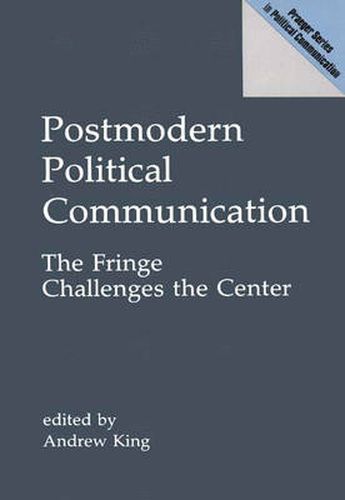Readings Newsletter
Become a Readings Member to make your shopping experience even easier.
Sign in or sign up for free!
You’re not far away from qualifying for FREE standard shipping within Australia
You’ve qualified for FREE standard shipping within Australia
The cart is loading…






Analyses of political dialogue have traditionally concentrated on structures of government or social movements, drawing clear boundaries between the individual and the state. In its examination of the marginal fringe groups struggling to secure power, Postmodern Political Communication aims to broaden our conception of political behaviour and places new emphasis on the generation and invention of politics. This volume’s contributors examine the discourse of deviant, oppressed and powerless groups from the point of view of empowerment; that is, how do such outsider groups engage the centre and how are they able to use mass media to gain political power? The authors study the discourse of those who seem most alienated from the formal political process: religious cults, youth gangs, submerged culture groups, and illegal aliens. Their analyses concentrate on the ways in which postmodern discourse legitimizes distribution of power in the social order, and disclose the ideological and political messages of communicative theory and nonpolitical expression. With its explorations of communicative theory and implications for praxis, this work may appeal to a large audience of scholars and practitioners in political science and communication.
$9.00 standard shipping within Australia
FREE standard shipping within Australia for orders over $100.00
Express & International shipping calculated at checkout
Analyses of political dialogue have traditionally concentrated on structures of government or social movements, drawing clear boundaries between the individual and the state. In its examination of the marginal fringe groups struggling to secure power, Postmodern Political Communication aims to broaden our conception of political behaviour and places new emphasis on the generation and invention of politics. This volume’s contributors examine the discourse of deviant, oppressed and powerless groups from the point of view of empowerment; that is, how do such outsider groups engage the centre and how are they able to use mass media to gain political power? The authors study the discourse of those who seem most alienated from the formal political process: religious cults, youth gangs, submerged culture groups, and illegal aliens. Their analyses concentrate on the ways in which postmodern discourse legitimizes distribution of power in the social order, and disclose the ideological and political messages of communicative theory and nonpolitical expression. With its explorations of communicative theory and implications for praxis, this work may appeal to a large audience of scholars and practitioners in political science and communication.